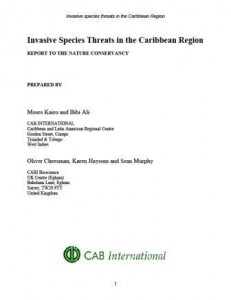This report represents the first concerted attempt to collate and synthesise information on threats posed by invasive species in the insular Caribbean. The synthesis was based on direct interaction and input from a range of stakeholders throughout the region. With few exceptions such as Cuba, and the Netherlands Antilles, it is anticipated that views expressed are largely representative of the regional status of invasive species issues. A database comprising a range of information on of invasive species was developed. The database can be queried using various search parameters. At present it contains information on 552 species. The information included varies from species and is reflective of the status of knowledge. The database is not complete and there is much additional data/gaps to be filled. The status of individual species in all broad community types (marine, freshwater and terrestrial) varies between islands but an attempt was made to identify the most serious threats at the regional level. It should be noted however, that priority species will vary from island to island and additional information will be required before completing the prioritization process. A database with contact details and areas of specialization for more than 250 people interested in invasive species issues in the Caribbean was also compiled. Current governmental regulations with relevance to invasive species were reviewed. Generally, specific legislation dealing with invasive species within the Caribbean is lacking. Much of what is available is outdated and does not satisfy agreed-upon international conventions and treaties.
Notwithstanding the efforts to update some legislation by certain countries, the risk, however, is that piecemeal updating of legislation will not lead to true harmonisation but will instead mean that the existing patchwork legal framework is simply replaced by a more modern patchwork legal framework in the Caribbean region. The present effort has initiated a process of collation of species information into a database. This needs to be built further, gaps in present information filled for each island. Priority areas which require action are identified. This includes development of national and regional policies and strategies, specific action plans to deal with present and potential problems, framework for exchange of information, capacity building among others.
Read full report here:IAS Threat to the Caribbean
